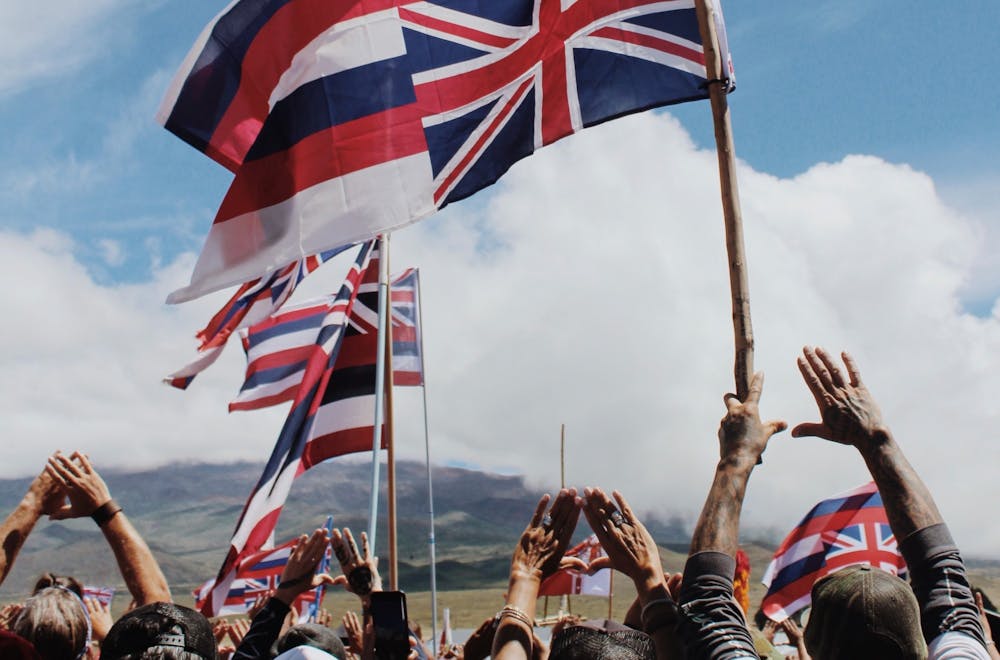When people see the word “Indigenous,” who do they think of?
For many — if not most — non-Indigenous people, Native Hawaiians aren’t the first to come to mind. As a Native Hawaiian who has repeatedly encountered the non-Native perspective (or lack thereof) about the connection between indigeneity and Native Hawaiians, I feel comfortable making this inference. Interactions with non-Natives have revealed to me that people rarely think about how Hawaiʻi was “annexed” or pushed into “statehood,” or how this history impacts Native Hawaiian life today. In fact, many people believe the relationship between Hawaiʻi and America is something we should be proud of.
This mindset is tangible: the romanticization of “aloha” and of a “tropical paradise,” of seeing Hawaiʻi merely as the “50th state,” of taking advantage of Hawaiʻi’s forced reliance on tourism and jumping at every opportunity to visit. The lack of regard for Native Hawaiians when it comes to honoring our indigeneity and existence is real, and its effects are visible. And it has been impacting Native Hawaiians and quality of life in Hawaiʻi for far too long.
About 10 million people visit Hawaiʻi each year. That’s more than seven times Hawaiʻi's entire residential population. This is not sustainable: non-Native people need to stop coming to Hawaiʻi.
Besides the fact that overtourism has created excessive congestion on the Islands and has thrown the distribution of resources into an imbalance for residents, Native Hawaiian culture also continues to be overly commodified, misconstrued, and exoticized. These mental and physical tolls caused by tourism are often most severe for Native Hawaiians who continually bear the trauma of centuries-long colonization. On top of being a significant portion of the homeless population and being constantly priced out of our homeland by the myriad of non-Natives who insist on moving to Hawaiʻi, kānaka maoli (Native Hawaiians) are having to grapple with the psychological and spiritual effects of witnessing the complete disrespect for and misrepresentation of Native Hawaiian culture and our ʻāina (land).
I’ve come face to face with the effects of tourism and absolute disregard for Native existence throughout my entire life. Ignorant of Hawaiian history, culture, and basic respect, non-Native visitors come to our Islands and trespass on lands that are often culturally significant and sacred. Similarly, tourists visit places that physically cannot accommodate everyone because they are so overpopulated, despite the countless broadcasts about issues caused by such overcrowding.
As someone who lives next to major tourist hotspots in the countryside, the nearest grocery and drug stores are often inaccessible to my family and I due to the sheer number of people that drive down every day for these destinations. This makes us have to take longer drives out of town just to get basic necessities. I know family and friends who must plan out their entire schedules around tourist traffic because, if they do not, they risk getting stuck in bumper-to-bumper traffic for hours on end. Sometimes these family and friends have no choice but to sit in traffic because roads are often still congested by the time they’re on their way home from work. This is our everyday reality.
The unceasing existence of tourism-related problems has only been exacerbated by other concerning issues. In particular, the U.S. Navy essentially poisoned about 93,000 Oʻahu residents when it leaked jet fuel into an aquifer that holds 250 million gallons of water in the Kapūkakī area (otherwise known as Red Hill). This occurred in spite of Board of Water Supply Manager Ernie Lau alerting the Navy for years that an accident could occur because of the facility’s poor conditions.
Despite these repeated warnings, the general public only became aware of the leak in Nov. 2021 when hundreds of people “complained of [a] gasoline-like odor” and reported “ailments like stomach cramps and vomiting.” After months and months of people enduring other ways to obtain safe, uncontaminated water, the Navy finally “completed work to restore the drinking water system” in March 2022.
You’d think that such a life-threatening situation would warrant a halt (or, at the very least, a decline) of tourists’ arrival to Hawaiʻi so that residents and tourists wouldn’t have to compete for clean water, a basic necessity. Yet nothing was done to mitigate this issue. Completely unaware of what residents and Native people were facing, tourists continued to arrive in droves. And people suffered because of it.
So, when I see countless Princeton students flying to Hawaiʻi for vacation — to see the same, overcrowded and often desecrated “attractions” — I’m reminded of what kānaka go through, day in, day out. Unless something changes, kānaka have no choice but to continue to endure these living conditions. It is us who must face these problems and find resolutions for them. Non-Native visitors have a home, another place they can go back to. We don’t.
There are always several counterarguments against the point that people shouldn’t visit Hawaiʻi. Many people feel entitled to visit Hawaiʻi because Hawaiʻi’s economy relies on tourism and they’re simply “contributing to the tourism revenue.” But the truth is, a lot of the time, people don’t really care about the state of our economy. They just want to fly to Hawaiʻi guilt-free. And it shouldn’t be a surprise that most of the tourism revenue doesn’t even benefit Native Hawaiians, whom the tourism industry exploits the most.

In honor of this year’s Indigenous Peoples’ Day, I want to emphasize this: you cannot claim to respect, advocate for, or try to empower Indigenous people while also traveling to Hawaiʻi. Thinking otherwise just means you don’t see Hawaiʻi for what it is and Native Hawaiians for who we are: a nation that is fighting for our autonomy and deserved place in our own land.
Gisele Bisch is an Assistant Opinion Editor and Anthropology major from the North Shore of Oʻahu (Hawai‘i). She can be reached at gb8528@princeton.edu.








